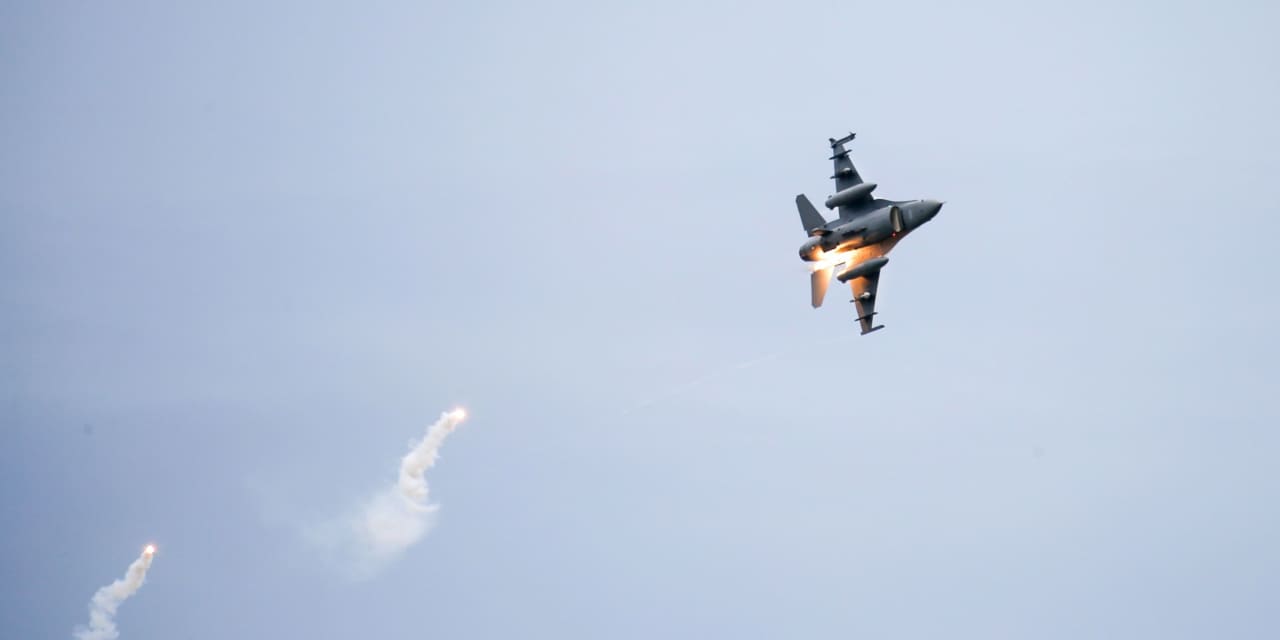Major defense stocks including
Lockheed Martin
added some $23 billion in market capitalization Monday following weekend attacks by Hamas against Israel. Now Wall Street is working through details to see what might come next for the sector—and most see opportunity.
Just not because of the current conflict. Shares of defense contractors surged Monday. Lockheed Martin (ticker: LMT),
Northrop Grumman
(NOC),
General Dynamics
(GD),
L3Harris Technologies
(LHX),
Huntington Ingalls Industries
(HII),
RTX
(RTX), and
Boeing
(BA) all rose Monday by an average of 6.5%. Shares of Northrop surged more than 11%. Shares of Boeing, which is more of a commercial aerospace company, rose 0.6%.
The rise reflected growing geopolitical uncertainty. Saturday, Hamas attacked Israel, taking hostages in the process. How the conflict will escalate, including involvement by other nations including Iran, a traditional backer of Hamas, is hard to say.
“Our view remains that, presuming the Israel-Hamas war does not become a regional war, the impact on defense fundamentals should be limited,” wrote Capital Alpha analyst Byron Callan in a Tuesday report. “Hamas won’t be resupplied with military equipment or materials to make weapons. We expect an intense Israeli operation to bring about the defeat of Hamas as quickly as possible.”
That implies that some of the one-day bounce in defense stocks will fade. Still, there is a case to make for defense stocks even after the initial bounce.
TD Cowen analyst Cai von Rumohr, like Callan, is hoping for a more limited conflict. Still, there is likely to be some modest, positive impact on military spending.
“The Israel-Hamas crisis is apt to bolster support for U.S. military spending with focus on tactical ground warfare scenarios. This would favor fighter aircraft, tactical missiles, [electronic warfare], radios, air defense, helicopters, and vehicles,” he wrote Tuesday. “But given that production of most of these items already is in a ramp, the crisis likely won’t produce much incremental sales or profits for contractors over the next two years.”
How the stocks will perform is hard to say, so von Rumohr looked at prior conflicts for some context. The Russian invasions of Afghanistan in 1979 and Ukraine in 2022 produced spikes in defense stocks.
Defense outperformed the market in 1979 and the first half of 1980 before underperforming the market in the second half of that year. Defense stocks jumped after the Ukraine invasion but hadn’t done much before Monday. Lockheed shares were down a little, between late February 2022 headed into Monday trading, similar to the move of the S&P 500 over the same span. Northrop shares were up a couple of percent.
“We don’t see a practical tactical trade in Defense as a result of the attack on Israel,” wrote Seaport analyst Richard Safran. There isn’t a specific company or part of the defense industry he sees benefiting more than others. Still, he likes the sector. The stocks are attractive.
Defense shares weren’t strong performers lately. Coming into the week, only Boeing was up over the past 12 months. The average move for the rest, excluding Boeing, was down about 14% over the past year, while the
S&P 500
was up about 19%.
The drops left defense stocks, excluding Boeing’s, trading for about 14.5 times estimated 2024 earnings, down from about 17 times, the historical average in recent years. Boeing earnings are still depressed following Covid and 737 MAX issues, and the stock trades for about 38 times estimated 2024 earnings.
“We never recommend chasing stocks, however, we still see substantial upside to Defense stocks from current levels,” added
Safran.
“Despite the bump in the stocks, Defense does not appear to be an over-crowded trade.”
His “best ideas” are Lockheed, Northrop, and L3Harris. Citi analyst Jason Gursky feels like Safran. “While the most recent tensions in the Middle East aren’t likely to drive estimate revisions in the near term, we do expect industry revenue to accelerate in 2024 and 2025 as higher spending bills passed over the past several years begin to make their way through the income statements of our coverage companies.”
Among the large defense players, he rates General Dynamics, Lockheed, and L3Harris Buy.
Brian Swint contributed to this article.
Write to Al Root at [email protected]
Read the full article here





